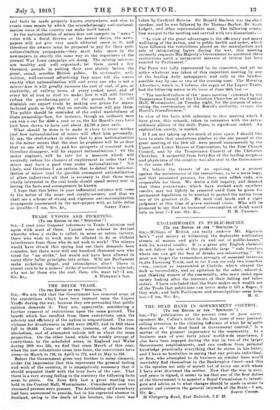THE DRINK TRADE.
[To THE EDITOR OF THE "SPECTATOR."] Sm,—We are told that the Government has removed some of the restrictions which have been imposed upon the Liquor Traffic during the war, because they are persuaded that public opinion demands it. They are, apparently; considering a further removal of restrictions upon the same ground. The benefit which has resulted from these restrictions upon the sobriety and efficiency of the nation is unquestioned. The convictions for drunkenness in 1913 were 188,877, and in 1918 these fell to 29,019. Cases of delirium tremene, of deaths from alcoholism, and of attempted suicide fell in about the same proportion. On the other hand, while the weekly average of convictions, in the scheduled areas, in England and Wales during 1918 was 535, we find that since March of this year, when the new relaxations came into force, the convictions have risen—in March to 710, in April to 772, and in May to 816.
Before the Government gives way further to noisy clamour, under the impression that this represents the general feeling and wish of the country, it is impeeetively necessary that it should acquaint itself with the true facts of the case. That there is a very strong feeling to the contrary the following facts seem to prove. On June 24th last a great meeting was held in the Central Hall, Westminster. Considerably over two thousand persons were present. The Archbishop of Canterbury had been announced to preside, but in his regretted absence in Scotland, owing to the death of his brother, the chair was taken by Cardinal Bourne. Sir Donald Maclean was the chief speaker, and he was hallowed by Sir Thomas Barlow, Dr. Scott Lidgett, and other representative men. The following resolution was put to the meeting and carried with two diseentients :—
" In view of the great advantages to the efficiency and moral well-being of the nation, a-nd to public health and order, which have followed the restrictions placed on. the manufacture and sale of intoxicating liquor during the war, this meeting earnestly requests His Majesty's Government to maintain these restrictions until a permanent measure of reform has been enacted by Parliament."
The Press was fully represented by its reporters, and yet no notice whatever was taken of this important meeting by any of the leading daily newspapers, and only in the briefest possible way by one or two of the evening ones. The Morning Advertiser, which is, I believe, the organ of the Liquor-Trade, had the following notice in its issue of June 26th last :—
"The marked failure of the 'mass meeting ' convened by the Temperaece Council of the Christian Churches at the Central Hall, Westminster, on Tuesday night, for the purpose of advocating the continuation -of the Board's authority, reveals the Board's friendlessness."
In view of the facts with reference to that meeting which I have given, this remark, taken in connexion with the extraordinary silence of the daily Press, is significant indeed. An explanation, surely, is needed.
If I am not taking up too much of your space, I should like here to state that resolutions similar to the one passed at the great meeting of the 24th ult. were passed unanimously by the Upper and Lower Houses of Convocation, by the Free Church Council, and by the Temperance Council of the Christian Churches. A memorial from forty-five of the leading surgeons and physicians of the country was also sent to the Government to the same effect.
We believe the threats of an uprising, as a protest against the maintenance of the restrictions, to be a mere bogy, and that interested persons, for their own selfish ends, are responsible for them. We desire a full inquiry, and demand that these restrictions, which have worked such excellent results, may not lightly be removed until time be given for permanent legislation to be enacted to protect the nation front one of its greatest evils. We need cool heads and a right judgment at this time of grave national crisis. Who will he prepared to say that an increased consumption of drink would
help us here ?—I ant, Sir, &c., , H. H. CROYDON.














































 Previous page
Previous page